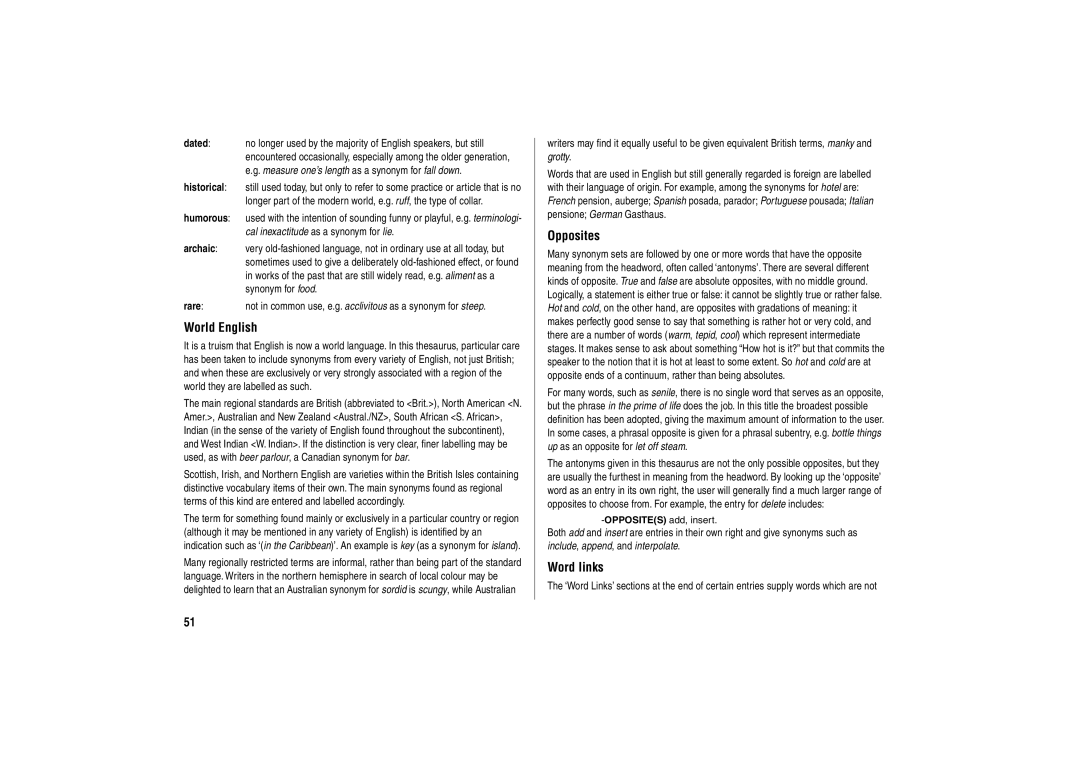dated: no longer used by the majority of English speakers, but still encountered occasionally, especially among the older generation, e.g. measure one’s length as a synonym for fall down.
historical: still used today, but only to refer to some practice or article that is no longer part of the modern world, e.g. ruff, the type of collar.
humorous: used with the intention of sounding funny or playful, e.g. terminologi- cal inexactitude as a synonym for lie.
archaic: very
rare:not in common use, e.g. acclivitous as a synonym for steep.
World English
It is a truism that English is now a world language. In this thesaurus, particular care has been taken to include synonyms from every variety of English, not just British; and when these are exclusively or very strongly associated with a region of the world they are labelled as such.
The main regional standards are British (abbreviated to <Brit.>), North American <N. Amer.>, Australian and New Zealand <Austral./NZ>, South African <S. African>, Indian (in the sense of the variety of English found throughout the subcontinent), and West Indian <W. Indian>. If the distinction is very clear, finer labelling may be used, as with beer parlour, a Canadian synonym for bar.
Scottish, Irish, and Northern English are varieties within the British Isles containing distinctive vocabulary items of their own. The main synonyms found as regional terms of this kind are entered and labelled accordingly.
The term for something found mainly or exclusively in a particular country or region (although it may be mentioned in any variety of English) is identified by an indication such as ‘(in the Caribbean)’. An example is key (as a synonym for island).
Many regionally restricted terms are informal, rather than being part of the standard language. Writers in the northern hemisphere in search of local colour may be delighted to learn that an Australian synonym for sordid is scungy, while Australian
writers may find it equally useful to be given equivalent British terms, manky and grotty.
Words that are used in English but still generally regarded is foreign are labelled with their language of origin. For example, among the synonyms for hotel are: French pension, auberge; Spanish posada, parador; Portuguese pousada; Italian pensione; German Gasthaus.
Opposites
Many synonym sets are followed by one or more words that have the opposite meaning from the headword, often called ‘antonyms’. There are several different kinds of opposite. True and false are absolute opposites, with no middle ground. Logically, a statement is either true or false: it cannot be slightly true or rather false. Hot and cold, on the other hand, are opposites with gradations of meaning: it makes perfectly good sense to say that something is rather hot or very cold, and there are a number of words (warm, tepid, cool) which represent intermediate stages. It makes sense to ask about something “How hot is it?” but that commits the speaker to the notion that it is hot at least to some extent. So hot and cold are at opposite ends of a continuum, rather than being absolutes.
For many words, such as senile, there is no single word that serves as an opposite, but the phrase in the prime of life does the job. In this title the broadest possible definition has been adopted, giving the maximum amount of information to the user. In some cases, a phrasal opposite is given for a phrasal subentry, e.g. bottle things up as an opposite for let off steam.
The antonyms given in this thesaurus are not the only possible opposites, but they are usually the furthest in meaning from the headword. By looking up the ‘opposite’ word as an entry in its own right, the user will generally find a much larger range of opposites to choose from. For example, the entry for delete includes:
-OPPOSITE(S) add, insert.
Both add and insert are entries in their own right and give synonyms such as include, append, and interpolate.
Word links
The ‘Word Links’ sections at the end of certain entries supply words which are not
51
